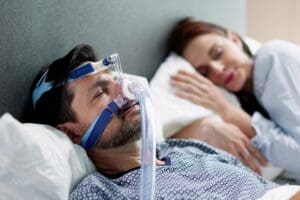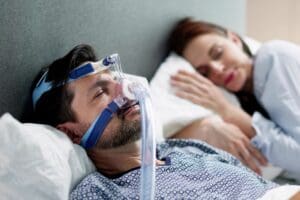Better Sleep, Better Performance: How Technology Like CPAP Machines Is Transforming Sleep Health


We’ve all experienced it — that foggy, exhausted feeling after a poor night’s sleep, where even simple tasks feel impossible. In today’s fast-paced world, quality sleep has become a luxury rather than a necessity.
With demanding work schedules, constant screen time, and endless stress, millions of Australians are struggling to get restorative rest. The result? A silent epidemic of sleep disorders affecting workplace performance, mental health, and overall well-being.
One of the most common culprits is sleep apnoea, a condition where breathing repeatedly stops and starts during sleep. What’s encouraging is that modern innovation is stepping in to help. Devices like CPAP machines are now transforming the way people manage sleep disorders, helping thousands of Australians reclaim the quality sleep they desperately need. If you’re curious about how technology is revolutionising sleep health — and whether it might be the solution you’ve been searching for — keep reading.
The Impact of Poor Sleep on Performance and Health
Before diving into solutions, let’s understand why sleep truly matters. Quality sleep isn’t just about feeling rested; it’s fundamental to how we function at work, at home, and in life generally.
During sleep, your brain consolidates memories, regulates emotions, and clears out toxic proteins accumulated throughout the day. When you’re well-rested, you experience sharper focus, better decision-making abilities, and increased productivity. Your immune system strengthens, your metabolism functions optimally, and your mental health improves.
Conversely, untreated sleep apnoea disrupts this restorative process. People with this condition experience fragmented sleep, repeatedly waking (often without realising it) as their airways collapse. The consequences are serious: chronic fatigue, poor concentration, irritability, and impaired judgment. Over time, untreated sleep apnoea can contribute to high blood pressure, heart disease, and stroke — making it not just an inconvenience, but a genuine health risk.
The good news? Today’s sleep technology is more accessible, effective, and user-friendly than ever before, offering hope to those struggling with sleep disorders.
Five Ways CPAP Technology Is Changing Sleep Health
If you’re considering CPAP therapy or simply curious about how it works, here’s what you need to know:
- Continuous Positive Airway Pressure Keeps Airways Open CPAP machines deliver a gentle, continuous stream of pressurised air through a mask, keeping your airway open throughout the night. This prevents the breathing interruptions that characterise sleep apnoea, allowing you to sleep uninterrupted and wake feeling genuinely refreshed.
- Improved Energy Levels and Daytime Function Users typically notice a dramatic difference within days or weeks. Morning grogginess lifts, daytime alertness improves, and that crushing fatigue begins to fade. Many Australians report feeling like themselves again for the first time in years.
- Better Cognitive Function and Decision-Making. With quality sleep restored, your brain functions at its peak. Concentration improves, memory sharpens, and decision-making becomes clearer — making a noticeable difference in workplace performance and personal relationships.
- Reduced Health Risks Regular CPAP use helps regulate blood pressure, reduces strain on the heart, and lowers the risk of cardiovascular complications. You’re not just sleeping better; you’re protecting your long-term health.
- Enhanced Mental Health and Mood Sleep and mental health are intrinsically linked. As sleep quality improves, many people experience reduced anxiety, better mood stability, and improved emotional resilience. The psychological benefits often rival the physical ones.
The Comfort Factor: Why CPAP Sleep Apnoea Masks Matter
Here’s something crucial that often gets overlooked: the best therapy in the world won’t work if you can’t comfortably stick with it. This is where CPAP sleep apnoea masks become essential to long-term success.
Think about it — you’re wearing this device for seven to eight hours every night. If the mask is uncomfortable, poorly fitting, or causes irritation, you’ll likely abandon therapy, and all those potential benefits disappear. That’s why modern CPAP masks have undergone revolutionary improvements.
Today’s masks come in various styles — nasal pillows for minimal contact, full face masks for mouth breathers, and hybrid designs offering the best of both worlds. They’re constructed from softer, more breathable materials that reduce skin irritation and pressure marks. Many feature adjustable headgear that accommodates different head shapes and sizes, ensuring a secure yet comfortable fit.
The advancement in mask design has been game-changing. Early CPAP masks were bulky, uncomfortable, and often caused claustrophobia. Modern versions are lighter, more discreet, and designed with user comfort as a priority. Some even include features like heated tubing and quiet motors, creating a more pleasant therapy experience overall.
This focus on comfort has dramatically improved compliance rates. When your mask fits properly and feels comfortable, you’re far more likely to use your CPAP consistently, maximise the health benefits, and maintain therapy long-term.
Making Sleep Technology Work for You
If you’re struggling with sleep apnoea or suspect you might be, the first step is a proper diagnosis from a sleep specialist. They’ll conduct a sleep study to confirm the condition and determine the appropriate treatment.
Once you’ve got your CPAP machine and mask, there’s typically an adjustment period. Your body needs time to adapt to wearing the mask and breathing with the machine’s pressure. Most people find that persisting through the first week or two leads to noticeable improvements. Working closely with your healthcare provider during this time can help troubleshoot any issues and optimise your therapy settings.
The beauty of modern CPAP technology is its accessibility. Machines are now quieter, more portable, and more affordable than previous generations. Many come with helpful features like data tracking, allowing you to monitor your progress and share information with your doctor. Some even offer smartphone apps for easy management and support.
Sleep Investment Pays Dividends
Investing in your sleep health might seem like a small decision, but the returns are enormous. Better sleep doesn’t just mean waking up less groggy — it means improved energy throughout the day, sharper mental clarity, better emotional regulation, and enhanced overall well-being. It means performing better at work, being more present with loved ones, and protecting your long-term health.
Whether you’re managing sleep apnoea with CPAP therapy or simply prioritising better sleep through lifestyle changes, the message is clear: quality rest is non-negotiable. Technology like CPAP machines has made treating sleep disorders more achievable than ever before, removing the barriers that previously kept people from getting help.
If you’re struggling with sleep, don’t resign yourself to fatigue and poor performance. Explore the solutions available, whether that’s CPAP therapy, mask upgrades, or a combination of technology and lifestyle adjustments. Your better-rested, more productive self is waiting on the other side of consistent, restorative sleep. The only question is: are you ready to prioritise it?
Read more:
Better Sleep, Better Performance: How Technology Like CPAP Machines Is Transforming Sleep Health




